On a Sunday morning deep inside the dense urban sprawl that pokes out of Buenos Aires from nearly every direction, Florencio Varela is starting to wake up. Pablo Ledesma and I pull off the highway and the stands selling potatoes by the kilo and bags of charcoal turn into makeshift corner stores, toy shops, tamale vendors, and smokey grills on people’s front lawns.
On a regular weekend, this street would be the site of an outdoor market, Ledesma explains, as we round the corner of one of the main drags and pull into his driveway. He pushes back the black metal gate and a perfume of onions browning on a flat-top grill and french fries hissing in hot oil hangs dense in the thick air. A long line of neighbors standing along the sidewalk outside the nextdoor butcher shop crane their necks to glance inside at a carport turned burger shack. Further up the yard, Ledesma’s father, Pablo Sr., flips pork ribs on the barbecue while his mother, Rosa Carmen, bounces between the kitchen and the garden.
This scene is becoming more commonplace as a national quarantine barrels toward its seventh month and an already tense working class gets pushed further into the margins. Across Buenos Aires, and likely the rest of Argentina, cooks with reduced hours—or no hours at all—are birthing homegrown food projects for financial and creative sustenance. Ledesma opened up CH (pronounced say-ah-che), named after the local vernacular for the thoroughfare it sits on, with childhood friends José Ruiz and Braian Cordoba. The trio grew up a few doors down from one another and have worked together as line cooks for the same restaurant group for the last twelve years—all commuting an hour into the city and back five days a week.
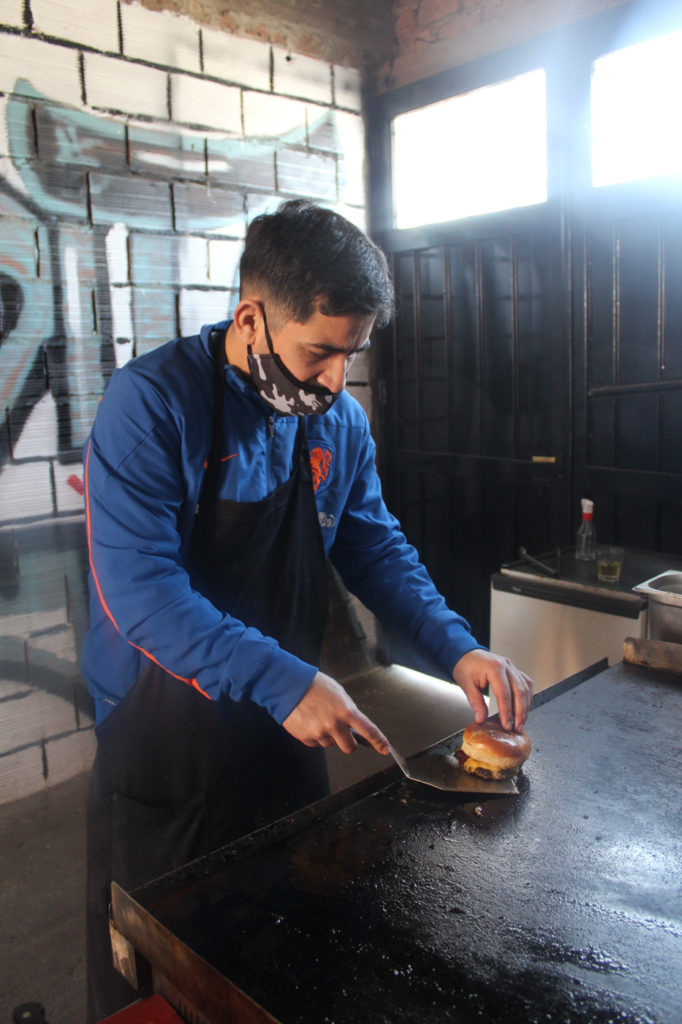

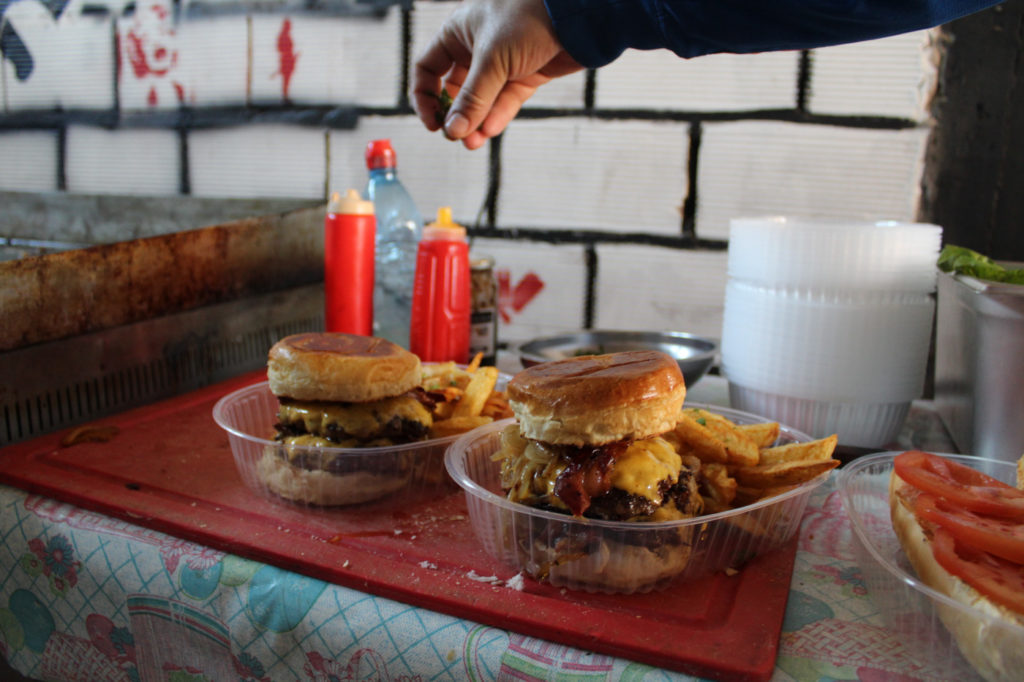
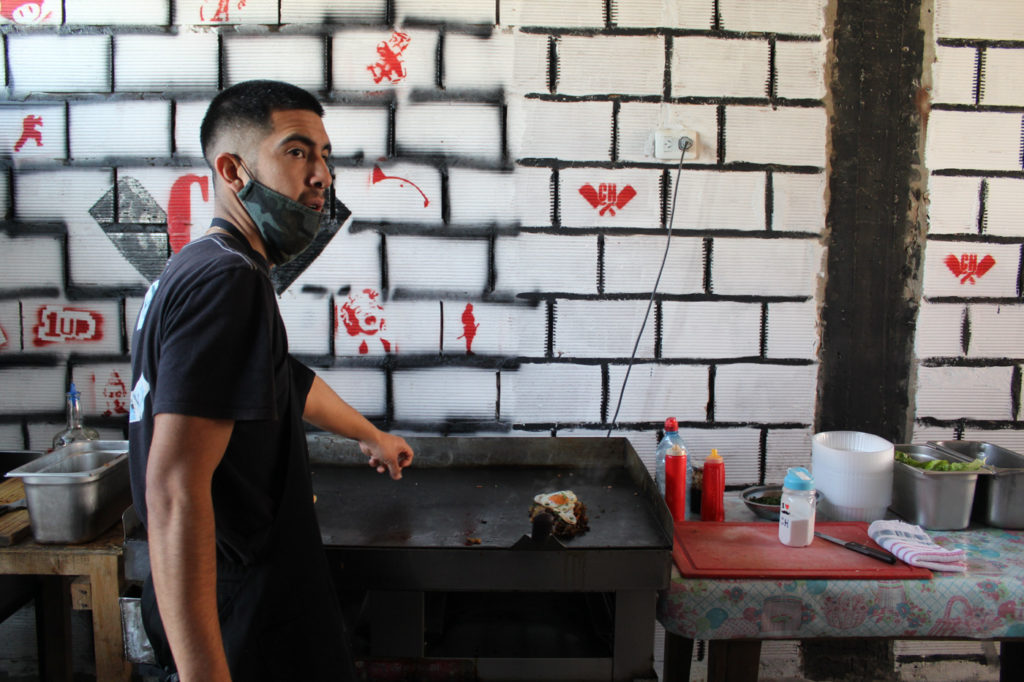
Although Ledesma, Ruiz and Cordoba got started slightly before the quarantine, they are the beneficiaries of a grassroots culinary movement that, for many, is thriving under lockdown. CH is currently serving cheeseburgers, pork tacos, and chopped beef sandwiches for takeaway and delivery on Sundays; but the demand has grown fast and neighbors have quickly become regulars. “There isn’t very much around here that serves the neighborhood and we want to help change that,” explains Ledesma. “We never expected this to take off so quickly. We are growing faster than we could have ever imagined.”
___
Before a national lockdown was even announced in mid-March, a wave of voluntary closures erupted across the restaurant community in solidarity with the government’s call to stay at home and battle off the emerging COVID-19 health crisis. After a few weeks, the metal shutters were pulled back up, but for the months that have followed, much of the country has remained indoors while the government flip flops between total lockdown, social distancing, and back again. In the absence of meaningful government assistance for both business owners and workers, the restaurant industry has reacted disparately to a takeaway model. In the best case scenario, they will break even and wait it out, while weighing the possible necessity of shaving down staff or, at worst, closing altogether. In recent months, closures of big name restaurants have become more noticeable and so have the launches of home-baked projects like CH.
The idea of skirting around the rules is not new for businesses, and is a natural part of the socioeconomic ecosystem. Enterprise is costly in Argentina, and for millions of small businesses and freelancers who make up a big chunk of the economy, chronic inflation, frequent currency devaluations, and politics that furiously u-turn with every presidential election present a constant gamble.
Beginning under the table and working your way onto the books is a right of passage for many entrepreneurs. It’s a sort of safeguard to test out the waters and then stay afloat against external and completely uncontrollable risk. It is also an easy route to normalizing precariousness and using the economy to justify inequality between owners and workers. Food work is historically informal; doing right by your workers is often a matter of personal choice. Even under the most altruistic of intentions, restaurant workers are very likely to be underpaid, overscheduled, and provided with little benefits.
Going underground has long been a method for outsiders with little capital to tiptoe into the mainstream. For a long time, this meant speakeasy-style restaurants hosted in people’s living rooms, which began prominently appearing in the early 2000s in the aftermath of the largest default in history that sent the country into a tailspin. Puertas cerradas, or closed-door restaurants, became so popular that the city government supported app developers to help diners make reservations in completely illegal establishments.
In recent years, DIY food culture began taking on a completely different dimension, branching out alongside a rapidly global-reaching food scene in the form of dozens of pop-ups, artisanal tortilla makers, kimchi vendors, rare vegetable purveyors, and moonshine distillers. These food projects have always stuck to the fringes—disjointed and miniature scaled—never quite big enough to offset the established restaurant industry.
___
The pandemic is cultivating a new dynamic. While the restaurant industry asks for government intervention and ruminates over its future, power is being redistributed into the hands of cooks who are seeing opportunity tangled in necessity. Many are taking advantage of a paradigm shift in consumption and lack of overhead en masse, building out the dream projects they never had time to develop with total freedom in the absence of investors, owners and managers.
“A lot of us were feeling really comfortable at our jobs,” explains Pablo Moretti, who lost his at the start of the lockdown; quickly after, he launched La rentrée alongside cook Jonathan Morales. The duo met working in Paris and reunited to build an eclectic menu that changes frequently and reflects Parisian and Porteño sensibilities. According to Moretti, “The quarantine has been a push forward. We would turn this pop-up into a restaurant tomorrow if we had the chance.”
What we are witnessing is a surge forward in food culture, but unlike previous bumps in culinary reinvention that have swept through the city over the last two decades, this one is unusually decentralized and fiercely democratized. As cooks begin projects out of the homes and apartments they are forced to social distance in, they are unintentionally deconstructing a food narrative that historically concentrates power into few hands across a couple upper class neighborhoods in the city’s north.
All over Buenos Aires, areas that were largely left out of a changing food scene are sprouting and spreading the word across community-driven Facebook groups, Instagram, and word of mouth between neighbors. In the city’s center are La rentrée’s escalope sandwiches, a French-Argentine take on chicken-fried steak; and just a little further south is Argentine-Japanese chef Yoshi Nakandakare’s handmade ramen. To the northwest, out-of-work ice cream consultant Stefan Ditzend shifted to making hand-dipped ice cream cones under the name Cono Sur; and on the southeast, Glady Martinez’ Cocido Quemado recreates traditional Paraguayan dishes like mandioca empanadas and a fried beef and cassava pie called payagua mascada.
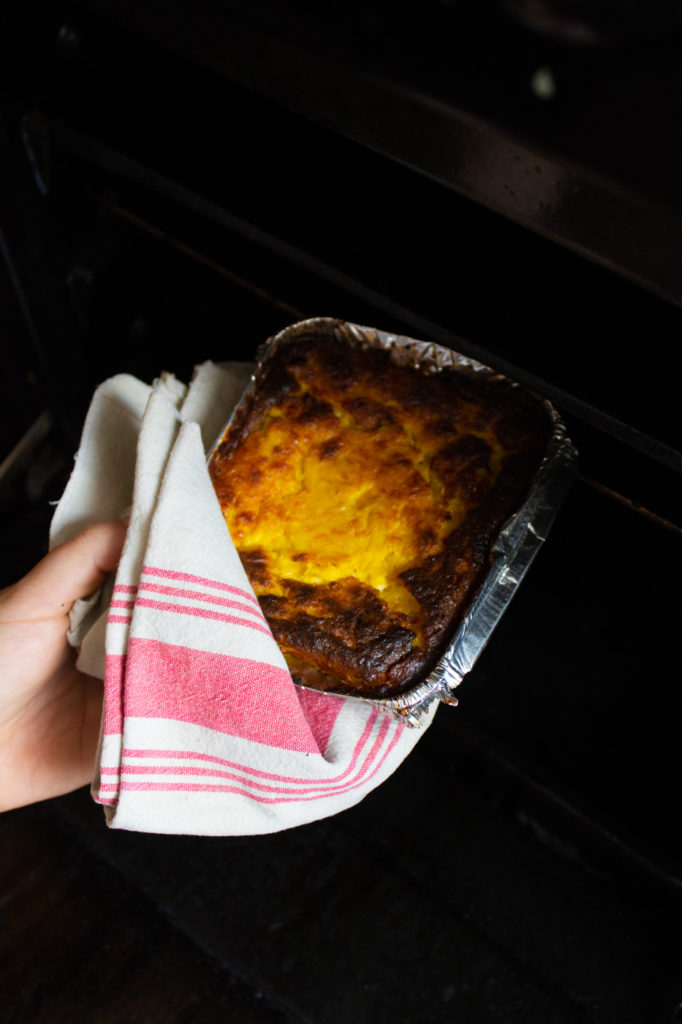
___
Nicólas Claverie grew up in the densely packed neighborhood of Caballito. When the quarantine hit, he was working in a bistro a few blocks from his apartment while moonlighting at a restaurant across town that was getting ready to open. When the latter was put on pause and the city paralyzed, he became more conscious of his eating habits and quickly noticed an absence of options nearby. “When this started and we couldn’t go anywhere, I thought to myself, ‘What do I want to eat? Where do I want to spend my money?’ It was really difficult to buy the food I wanted, and that was especially noticeable with bread and coffee. There are no specialty cafés anywhere in the neighborhood. If people want to get good coffee, they have to go fifty blocks over to Palermo, which is where most of the specialty cafés are,” explains Claverie.
He began reselling coffee beans for a local roaster with his own sourdough bread while experimenting with personal pastry cravings. On Saturday mornings he delivers mixed pastry boxes based on whatever he is able to get his hands on. Recently, this meant hibiscus twists, lemon cronuts, kumquat kouign-amann, and vermouth-candied brioche rolls. His sales quickly grew beyond what he was making at the bistro. “I decided to give my hours to the line cook who needs them more than I do and dedicate more time to baking,” he says. With a professional oven set to arrive soon, he hopes to move out of his apartment kitchen and open a small bakery somewhere in the neighborhood.
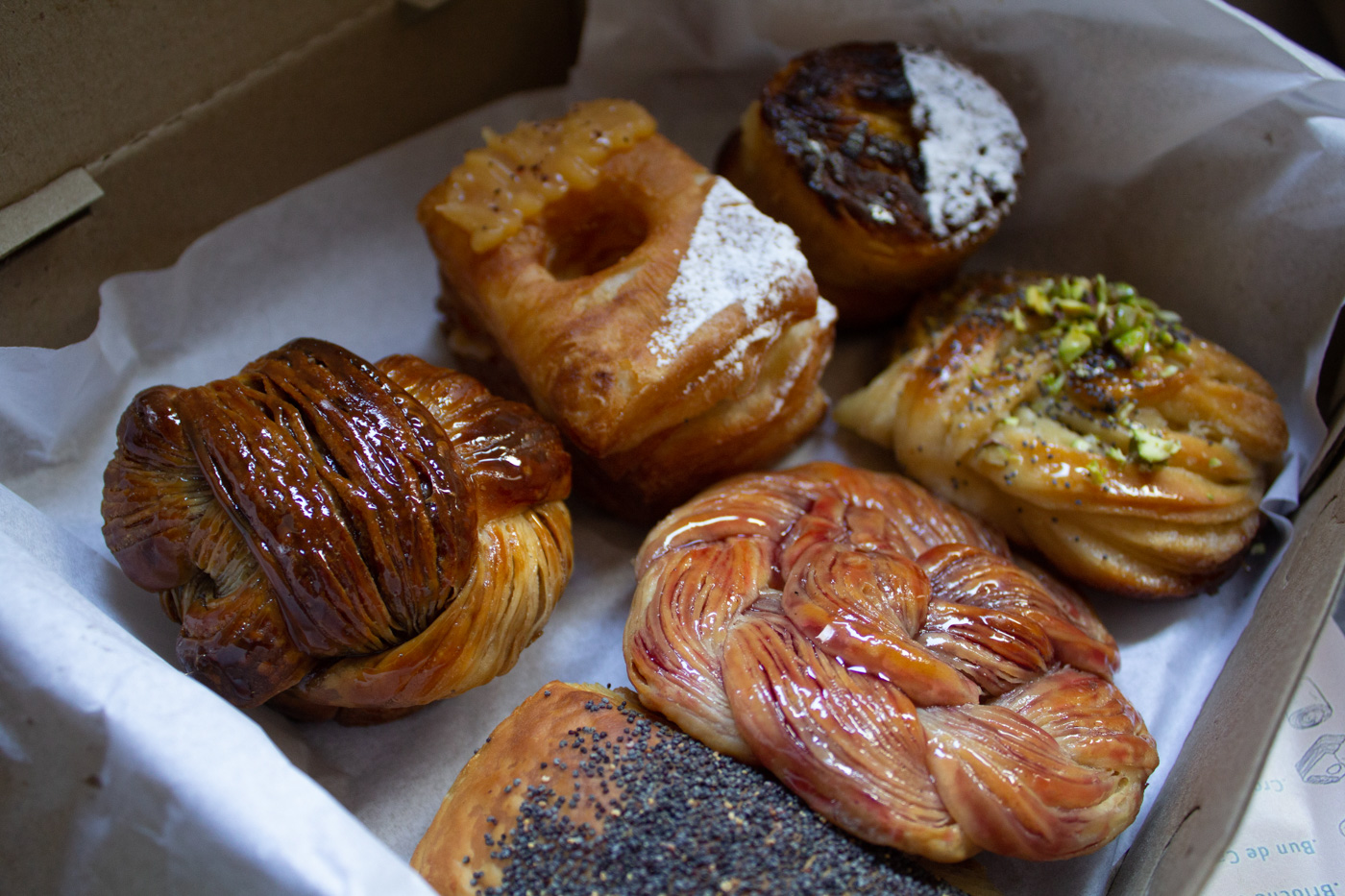
For the last four months in the residential zone of Villa Ortúzar, Daniela López Camino and Mauro Busquet Moriconi have been running a bi-weekly pizza night called FF Pizzas, named as a nod to the initials of the duo’s independent projects and the polarizing Fernández-Fernández Heads of State. They pull from his background in baking and hers in organic produce and fermentation to make pizzas topped with edible flowers, fermented almond cheese, or kimchi. They have seen such a positive impact in their own lives that López Camino quit her full-time job at an organic grocery store, and the pair installed a wood-burning clay oven on Busquet Moriconi’s rooftop terrace as they brainstorm plans to continue developing a future in a neighborhood in need of businesses like theirs.
“What the pandemia has revealed are the systems that most restaurants function within. A lot of people have realized there are other ways to work [with] less hours, healthier work conditions, and different surroundings where it is still possible to live well—maybe even make better money and feel protected in ways that the system doesn’t protect us,” López Camino explains. “We are fortunate to be able to see the positive side of all this and seek out another way to work. Thanks to everything that’s happening, we are able to look at this as a new path.”
As newfound entrepreneurs imagine the future that looms ahead, the industry could similarly use this bizarre historical moment as an opportunity to do some soul searching. The time has come to ask: what is the food world returning to on the other side of this? It is hardly a miracle that many restaurant workers built parallel projects that quickly took off in neighborhoods that have long been considered unworthy of evolving food culture. And although bootleg food projects are hardly a long-term solution, they are indicative of a need for change and proof of greener pastures.
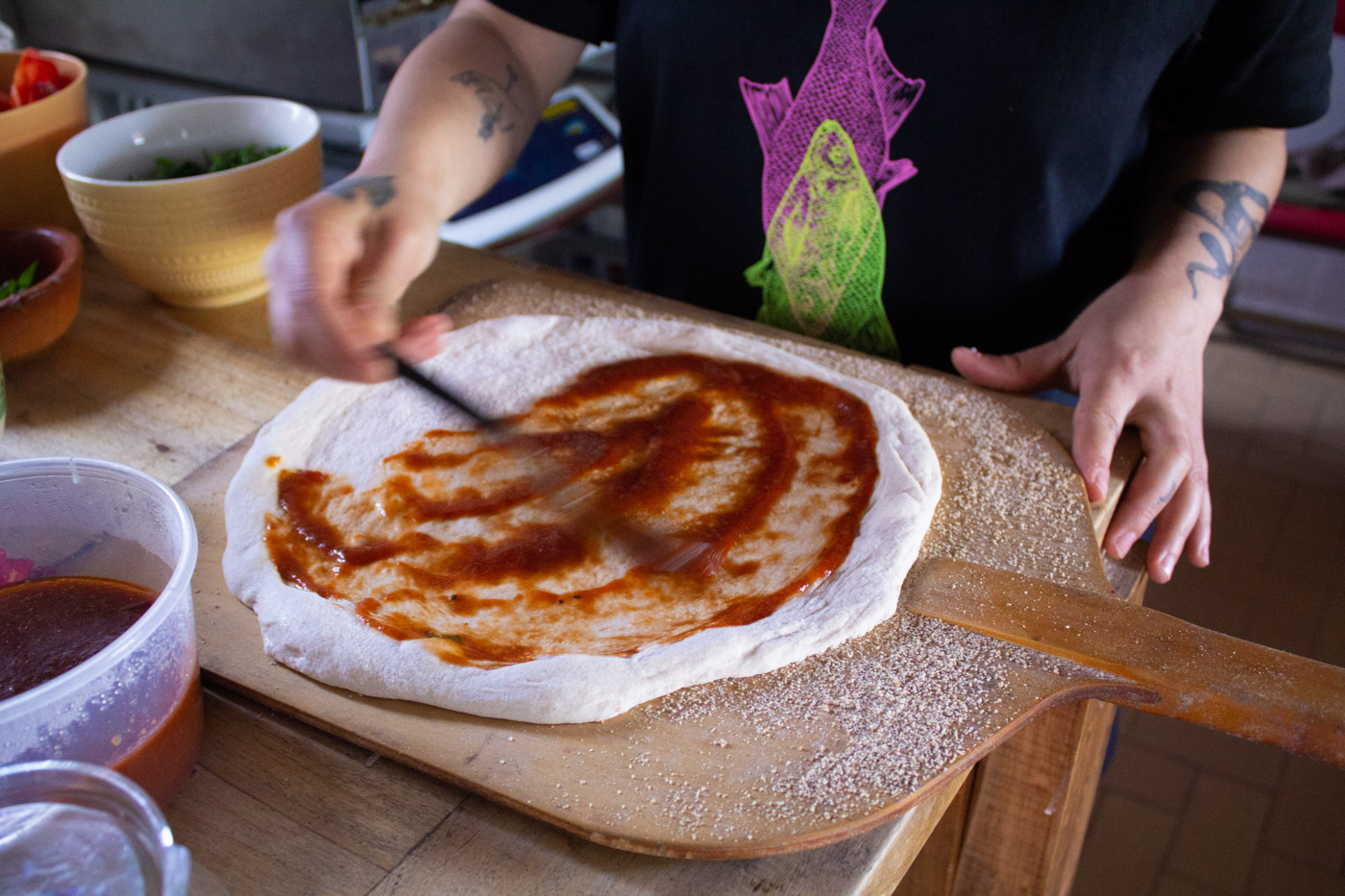

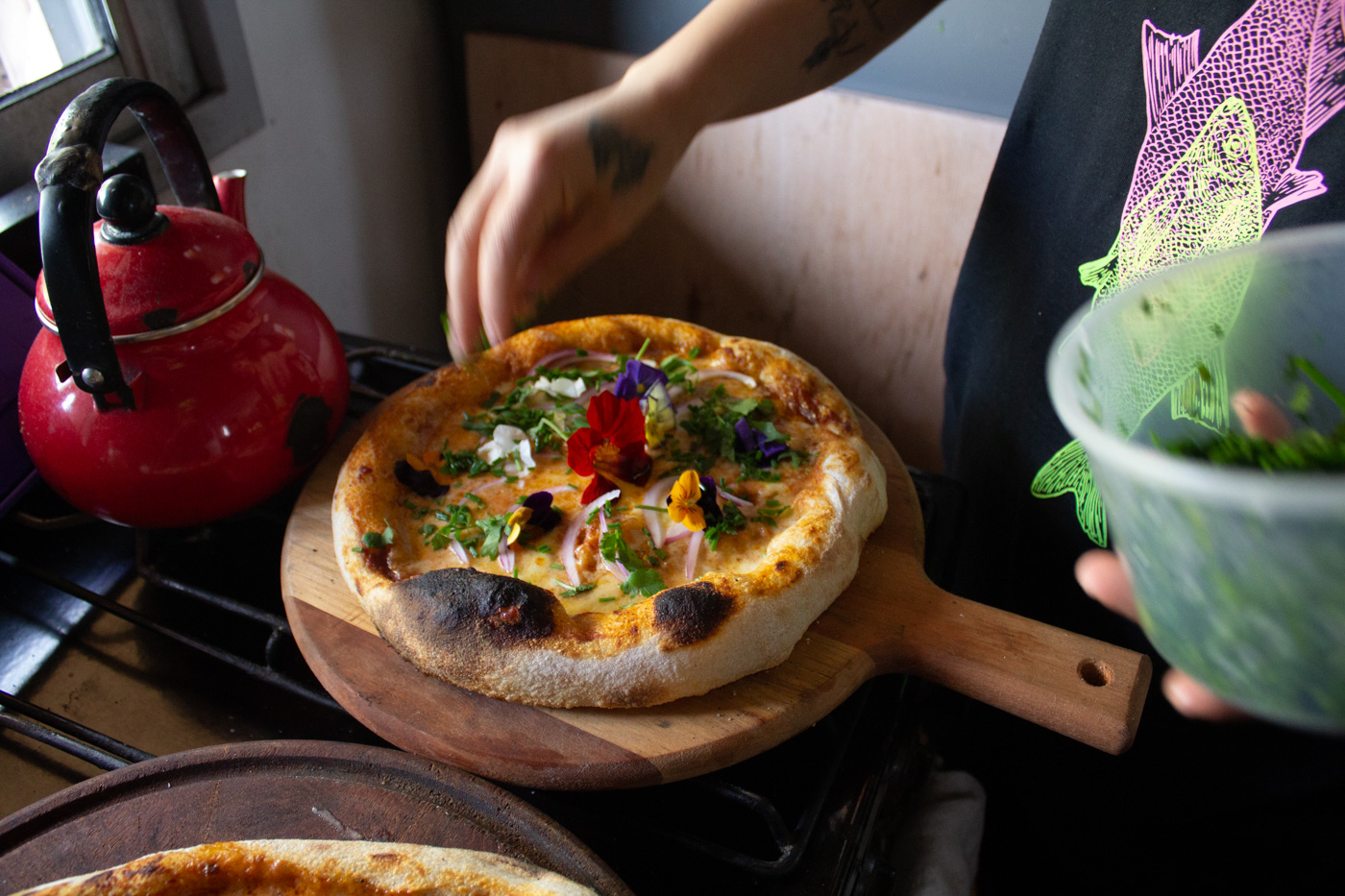
___
Back in Florencio Varela, Ledemsa stacks an off-menu homemade version of the Big Mac for his cousin, who has stopped in to get his Sunday fill. Ledesma, Cordoba and Ruiz see a future here on the street they grew up on. They are taking the time to get to know the idiosyncrasies of their hyper-localized customer base—like a community-wide aversion to unpeeled french fries—whilst reinvesting the profits into a brick and mortar location. Ledesma shows me around the family stationery shop, which is built into the front of the property and lays empty. There, they plan to install a bar for casual dining once the pandemic is over. He dreams of a hidden spiral staircase that leads upstairs to a private apartment and a test kitchen that is currently under construction; he was recently able to buy the materials for the roof.
Ledesma, Cordoba and Ruiz aren’t just putting money back into CH; they are eager to reinvest in the neighborhood. “There is another group making hamburgers that opened recently. We went as a team to eat and lend our support. This isn’t about competition. It’s about developing the neighborhood. I want to hire local and teach what I know, and show that we can do stuff here too,” Ledemsa says, not to self-aggrandize, but to emphasize the necessity to take advantage of an opportunity to dial things down to a community-driven scale.
This isn’t a project that many would bet on, and plenty of friends and family have encouraged the trio to consider safer gambles in more established commercial areas. But the crew is committed to watering their roots. “This is our future,” Ruiz chimes in. “Our neighborhood. A spot that’s ours. We want to be here.”





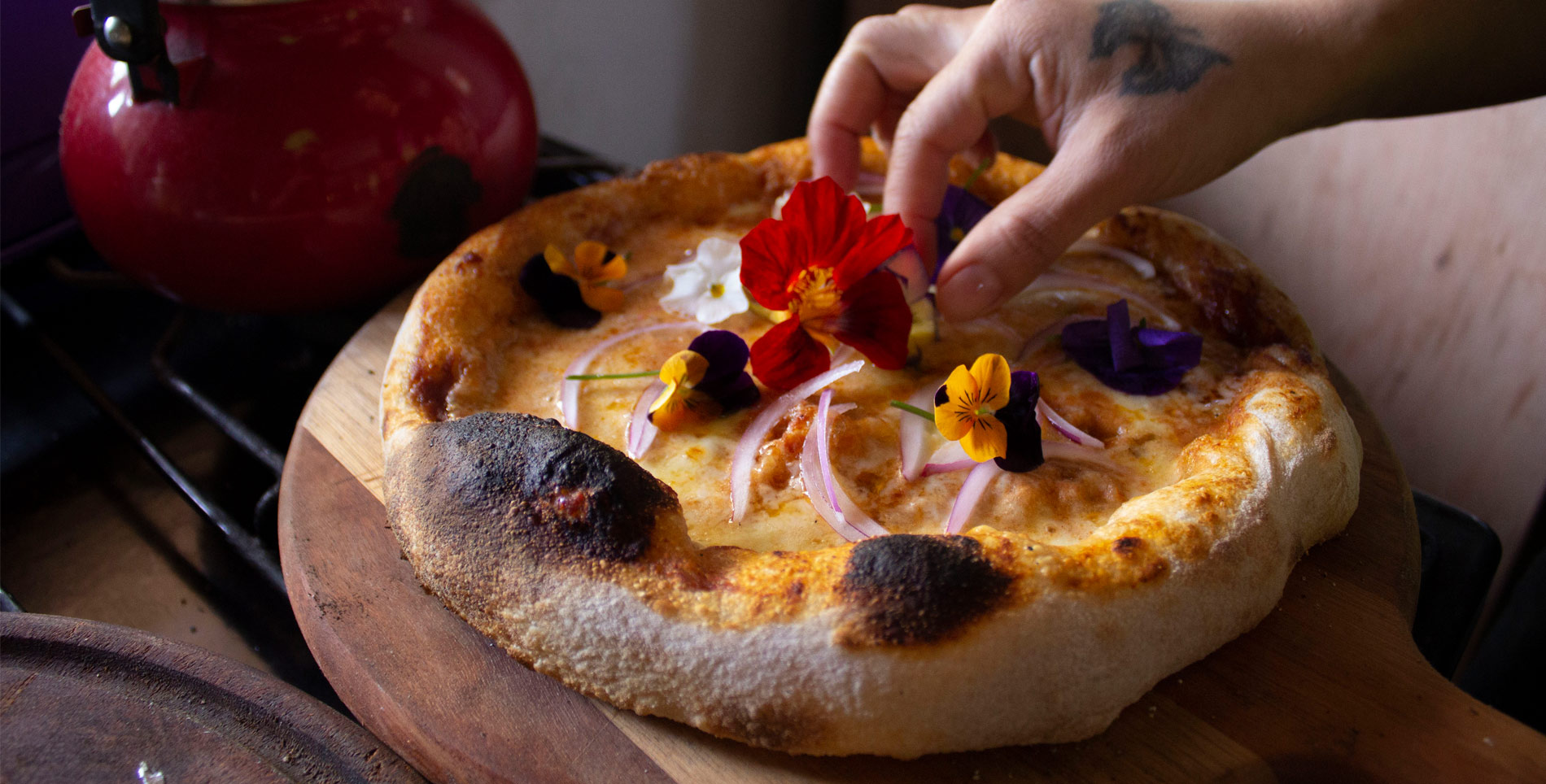

Our comments section is for members only.
Join today to gain exclusive access.